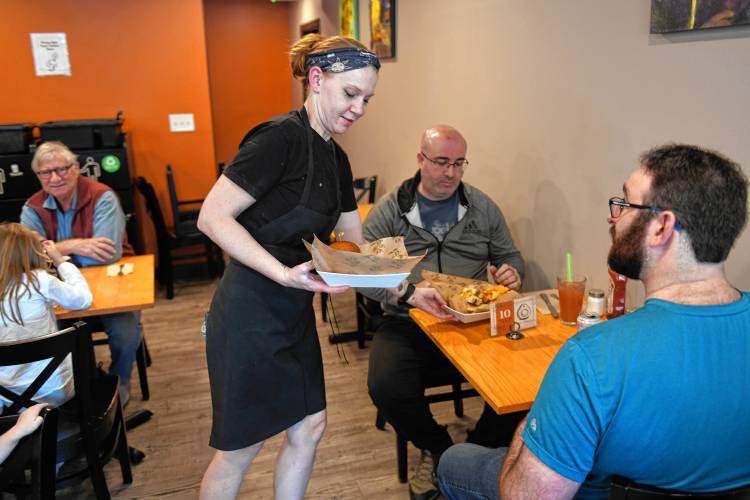Question 5: Do tipped workers need a raise? Controversial measure heads to voters
| Published: 10-14-2024 3:09 PM |
GREENFIELD — Voters will decide on Election Day whether to raise the minimum wage for tipped workers in Massachusetts, a controversial ballot initiative known as Question 5 that could change the landscape for the restaurant and bar industry and other jobs where tips are key to livelihoods.
Proponents of the measure believe it could offer greater financial stability for tipped workers, while opponents argue that its unintended consequences will yield more harm than good for both workers and employers.
Question 5 would gradually increase the minimum hourly wage for tipped workers from $6.75 excluding tips to $15 excluding tips over the course of five years. Currently, if a tipped worker’s $6.75 hourly wage plus their tips do not add up to a $15 per hour wage, their employer is required to pay them the difference. This would still be the case through the end of 2028 should the measure pass. The proposed law would permit employers to calculate this difference over the entire weekly or biweekly payroll period.
Under this proposal, employers paying tipped employees a wage that is at least the state minimum wage also will be allowed to administer a “tip pool” combining all of the tips received by tipped workers from customers and distributing them among all non-management workers, including non-tipped workers.
One Fair Wage, the advocacy group behind the initiative petition proposing the measure, estimates that about 240,000 Massachusetts workers would be impacted by this proposed law. In addition to financial stability for tipped workers, they contend the measure would reduce employee turnover and improve service quality.
In opposition, the Committee to Protect Tips cites the existing state and federal protections requiring that tipped workers make the minimum wage even if their tips fall short, and states that the implementation of such laws in other states and in Washington, D.C., have led to many workers losing or leaving their jobs. The organization also contends that the measure would reduce overall wages for workers while increasing costs for businesses and consumers, cautioning voters that the ballot question is “funded by a radical group from California,” referring to One Fair Wage.
Those who support the ballot measure share concerns that expecting customer gratuity to bring tipped workers up to the minimum wage can perpetuate inequality among the populations that have historically made up the majority of tipped workers, and that the protections in place to guard wages for these workers are not adequate enough to ensure financial stability.
In Turners Falls, Jillian Fishman owns the restaurant Dreamhouse located on 3rd Street and opened the restaurant in June of this year after having worked in the restaurant industry for two decades.
Article continues after...
Yesterday's Most Read Articles
Fishman pays all staff members $27 an hour, with a 20% “hospitality fee” listed on the bill. This system is different to tipping as it is included on the bill, and is taxed differently than tipping.
Fishman said that from her perspective, it’s important to pay a living wage, but she understands how this shift in pay for workers could be difficult for other businesses that don’t follow a similar structure as Dreamhouse. The hospitality fee goes into a bank account for the restaurant that then allows Fishman to pay her staff the $27 an hour wage.
“We were able to build in this structure from the get on our business, so this isn’t an adjustment we are going to have to make. So I understand the sentiment coming from other local business owners who anticipate seeing a pretty substantial increase to their labor costs,” Fishman said. “I think a lot of the restaurants in this area are very vocal about voting no on that initiative, and I understand why they’d feel that way.”
Fishman notes that adding tip pooling to the initiative feels as if it’s “burying the lede.” As someone who has worked as a tipped worker making minimum wage, she feels that people will still want to tip their servers.
In addition, Fishman believes that the measure would result in tipping being seen more as a reward for good service than a necessity.
Carrie Baker, professor of the study of women and gender at Smith College, said that about 68% of restaurant servers are women, many of whom are women of color or single mothers. She contends that a “dependence” on tips can create high rates of sexual harassment, because these women have to “smile and take it” to earn the tips they need.
“It’s often these large corporations that make a lot of money paying people low wages and expecting customers to make up the difference,” Baker said. “The kinds of restaurants that women are concentrated in are these chain restaurants, or bars or diners.”
Baker said that women are typically concentrated in “lower end” restaurants with lower tips and often lower quality work environments, while men tend to be concentrated in “higher end” restaurants where tips are abundant, which perpetuates the gender wage gap. The gap between female and male economic status, she said, is exacerbated by the fact that women are much more likely to be single parents than men.
She also argues that many small businesses already paying the full minimum wage plus tips, and that this measure would require large corporations to do so as well.
Baker also takes issue with the historical precedent behind tipped wages, which “comes from our history of slavery.” After enslaved people in the U.S. were freed, she said, some of the only places willing to hire them were restaurants and other places offering tipped positions where they could be paid abysmally low wages by the business, relying heavily on the reward of a customer’s tip for their service.
Ava LeBlanc, a junior at Smith College who has worked at Blueprint New American Bar and Grill for the past two years when she returns home to Westminster, also mentioned that she takes issue with this history behind tipping, and believes that tips should only be given on top of the minimum wage rather than helping bring wages up to that level.
Raising the tipped minimum wage, LeBlanc said, would also create more stability for herself and her colleagues. She said that, for many of her fellow servers, their wages can be hard to rely on as a livelihood since they can vary greatly with tips, causing turnover as servers leave to find a “more reliable wage” instead of staying at a job that’s “familiar and that they’re well trained in.”
“Well over 70% of the other servers that I work with are single mothers,” LeBlanc said. “I’d love to see them be able to rely on a stable wage instead of wondering if it’s going to be a $50 night or a $200 night.”
Jennifer Howard, owner of Leo’s Table in South Deerfield, said that she supports Question 5, although the change in minimum wage would not impact her existing business model.
“Approximately two years ago, about when COVID tipping fatigue started setting in, we transitioned to a tip free fair wage system. This involved studying the average amount of tips that staff took home on a weekly basis, to ensure wages were comparable to what they were receiving currently. We then raised all our staff members wages, as well as the menu prices to support the increases,” Howard explained in an email.
Prior to the pandemic, the business utilized a tip-pool for all non-management workers that was working at the time for employees, but the pandemic impacted the effectiveness of this system for tipped employees.
A tip-free wage system means that an employer would stop using tips as a means to makeup the difference between hourly wage and state minimum wage. Howard said this was a “frightful” shift when the decision was made to take this route with tipping and wages, but it has been beneficial for the business with higher wages, less staff turnover, increased profit and a higher applicant pool for positions.
Among those opposed to the measure, common concerns are that the increased minimum wage requirement will threaten small businesses while large corporations protect themselves with higher prices, and that tip pooling will be a disincentive for the relationship-building between tipped workers and customers that has become an integral part of such industries.
The Massachusetts Restaurant Association (MRA) is one of the major organizations in the state advocating against Question 5, with restaurant owners, workers, bartenders and service industry workers represented by the association.
When asked about the consequences of Question 5 passing, MRA Director of Government Affairs Jessica Muradian said there will be a loss of tips for servers, restaurants closing, job losses for tipped workers, higher consumer prices and non-tipped workers getting access to tip-pools for the first time.
She points to the District of Columbia and its passage of a similar ballot initiative in 2022 that increased minimum wage for tipped workers with the aforementioned consequences hitting restaurants in the D.C. area.
The MRA website says activists from outside the state of Massachusetts are part of the push for the Question 5 ballot initiative the MRA believes will do more harm than good to workers in the industry.
“Today, servers are pushing back on this extreme proposal that will hurt tipped employees in the Bay State,” the website states.
The outside activists the association refers to are from California which Muradian says are coming into the state and pushing the initiative despite Massachusetts workers saying they don’t want this sort of minimum wage increase for workers.
“They have not come from the state of Massachusetts, and they are out here telling our servers and bartenders what is good for them. Our servers and bartenders are coming to us and saying, ‘This is not good for us.’” Muradian said.
The MRA said that in a recent survey of servers and bartenders, 91% of respondents prefer the current earning system, with a lower base minimum wage and potential to earn more than the minimum wage through tips, with 56% reporting that they earn more than $30 an hour.
At Eastside Grill in Northampton, tipped workers pride themselves greatly on the relationships they build through their service, and share this worry that the potential for a “tip pool” might lead some to leave those relationships by the wayside.
“I personally would never work at a restaurant where they pool tips,” said Akasia McQuaid, a server at Eastside Grill. “Why should I have to share the tips I’ve earned with someone who might not be pulling their weight?”
McQuaid explained that she and her fellow servers at Eastside Grill have all been in the restaurant industry for years, all having worked their way up from “lower end” restaurants and diners. They share a concern that the ballot measure would create a disincentive for tipping, eliminating the reward for their years of work mastering their work.
“They’re fixing something that’s not broken,” said Diane Frary, a server at Eastside Grill for 34 years, about the measure. “I have very high standards for my work, and I like to be awarded for my work … it’s like a demotion for all of us.”
Mad Lawrence, bar manager and bartender at Eastside Grill, said that what has kept him passionate about the restaurant industry has been the relationships forged between staff and customers, as well as among the staff members themselves. But Lawrence said that the new minimum wage requirement would be a major cost for restaurants like Eastside Grill, leading them to shrink their operations in terms of space, hours, and in some cases, staff.
“There’s a huge amount of community in our industry,” Lawrence said. “That’s a huge part of our business.”








 ‘It’s a Wonderful Night in Turners Falls’ showcases village businesses, nonprofits
‘It’s a Wonderful Night in Turners Falls’ showcases village businesses, nonprofits Sackrey Construction Co. of Sunderland celebrating 35 years in business
Sackrey Construction Co. of Sunderland celebrating 35 years in business Photo: As darkness falls
Photo: As darkness falls Leverett residents rap Kittredge compound plans, urge caution as negotiations for 400 homes move forward
Leverett residents rap Kittredge compound plans, urge caution as negotiations for 400 homes move forward 
